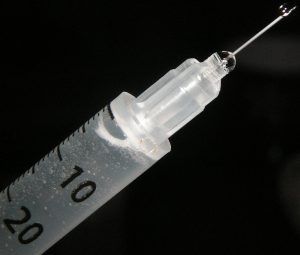Freeze-dried polio vaccine could end the disease
 University of Southern California researchers have developed an injectable freeze-dried polio vaccine that can be kept at room temperature in powder form for four weeks and then rehydrated without losing efficacy in mice. Because the vaccine doesn’t need refrigeration, it could potentially be used throughout more remote parts of the world where polio still lurks, in hopes of eradicating the disease. The study was recently published in the journal mBio.
University of Southern California researchers have developed an injectable freeze-dried polio vaccine that can be kept at room temperature in powder form for four weeks and then rehydrated without losing efficacy in mice. Because the vaccine doesn’t need refrigeration, it could potentially be used throughout more remote parts of the world where polio still lurks, in hopes of eradicating the disease. The study was recently published in the journal mBio.
The largest obstacle to polio eradication
Polio is fortunately is a fading memory in many places, and it is on the brink of complete eradication, with just 22 reported cases worldwide in 2017. The highly infectious disease causes lifelong paralysis and disability, mostly in young children.
In the United Sates, the polio epidemic started to end after mass immunization began in the 1950s. Since 1979, there have been no new polio cases originating in the US. However, recent polio cases have been reported in Nigeria, Papua New Guinea, Syria and Pakistan.
The largest obstacle to complete eradication has been creating a temperature-stable vaccine for use in areas without refrigeration. Freeze-drying, which removes moisture, has allowed researchers to create temperature-stable vaccines for measles, typhoid and meningococcal disease. However, scientists have been unable to create a polio vaccine that retains efficacy after freeze-drying and rehydration.
Freeze-drying a vaccine
In the new study, the researchers created a polio vaccine that doesn’t require refrigeration to maintain potency. The team used liquid chromatography and high-throughput screening to analyze many ingredients and formulations until they found one that was successful.
“Stabilization is not rocket science, so most academics don’t pay much attention to this field,” the study’s first author Woo-Jin Shin, PhD, said in a press release. “However, no matter how wonderful a drug or vaccine is, if it isn’t stable enough to be transported, it doesn’t do anyone much good.”
The researchers hope that a third-party foundation or company will fund human studies and bring their injectable vaccine onto the market.
If you work in this area of research, check out the dsRNA antibody from the Brass lab at University of Massachusetts Medical School, used to detect dsRNA intermediates of polio and other viruses. You might also be interested in our full portfolio of reagents for infectious disease research.


